
Person Quits After 3 Days Of Work After They Realized The Hybrid Work Model Was A Lie
In recent years, the option to work remotely has been a godsend for countless companies. It has kept high risk individuals safer during the pandemic, allowed families to spend more time together and simplified many workers’ days by eliminating commute times and costs. (Not to mention that nobody knows if you’re wearing pajama pants on a Zoom call, right?) While some businesses have recently returned to their offices, having flexibility to work from home has become a dealbreaker for many employees.
So when Reddit user InfamousCommission38 applied for a new job, the promise of a “hybrid” work environment was extremely appealing. Unfortunately, this week they found themselves recounting the tale of their short-lived position on the Antiwork subreddit. With 1.9 million members, r/Antiwork boasts the tagline “Unemployment for all, not just the rich!” and provides a space for fed up employees to bond. Keep reading to see InfamousCommission38’s frustrating encounter, similar stories from r/Antiwork and our exclusive interview with Dr. Lynne Kennette, a Professor of Psychology at Durham College. Then check out some of Bored Panda‘s other stories featuring remote work and terrible bosses!
After being promised a “hybrid” work environment, this employee was shocked to hear that working remotely was only allowed after 5pm
As the pandemic forced companies to adapt to remote work, many employees feel this lifestyle has actually benefitted them. A 2020 survey found that 80% of respondents believe having a job with flexibility allows them time to better care for their mental health. 92% of them even believe a flexible job makes them a happier person. An important benefit many note from working from home is reduction in stress levels. Over three quarters of employees surveyed reported that workplace stress negatively impacts their mental health, which can be mitigated by working from home. Not having to fight traffic twice a day and getting an additional half hour of sleep can go a long way in improving quality of life. That extra time can be used to take your dog for a walk, catch up with a friend, prepare healthier meals or read a few more chapters of that book you’ve been dying to finish.
In their article “Healthier at Home“, Dr. Lynne N. Kennette and Dr. Phoebe S. Lin explored the many psychological benefits of working remotely. They mention that simple advantages of being at home such as sitting closer to more windows can improve employees’ moods. Other factors that may cause stress in an office are much simpler to manage at home as well. Pregnant employees rushing to the bathroom with morning sickness and new mothers needing to find time to pump will have a much easier time at home. Caring for children in general becomes easier with a more flexible schedule, noted Kennette and Lin. Limiting time around toxic coworkers can also be a game changer in employee morale. Unfortunately, prejudices persist in some offices, but staying in the comfort of their homes allows groups often discriminated against, such as members of minority religious groups and transgender employees, a safer work environment.
In her interview with Bored Panda, Dr. Kennette told us that common misconceptions about working from home are that it’s easier or less work. “I know that I likely put in more hours working from home because I am less distracted,” she told us. “I don’t have colleagues popping into my office to tell me about their weekend, or to ask about my family.” “I really enjoy chatting with my colleagues, but it takes away from my work time!” she added. “And if you’re sick (or your child is), you are far less likely to use a sick day if you’re working remotely, so again, productivity is likely to be less affected by remote work than the traditional in-person office working conditions.” She’s right. Over the course of a two-year study, Professor Nicholas Bloom at Stanford University found that “employees working from home actually accomplished more of a ‘true’ full shift each day, as they didn’t use up time getting ready, commuting, leaving the office multiple times, or being late”. Companies even cut costs by eliminating the need to rent huge office spaces, making remote working a win for everyone.
Responses from readers are filled with shared frustration and support
Unfortunately many readers had similar experiences to share
We asked Dr. Kennette if she had any advice on incentivizing supervisors who are hesitant to let employees work remotely. She warns that it is a difficult topic to navigate, but “if you approach your supervisor with some research data that supports it as a viable option for you… then I think many will be open to at least having a conversation about it”. She also suggests proposing a “test period” of working remotely to see how it goes first. Although it’s no guarantee of change, Dr. Kennette still encourages employees to ask for what they believe will better their productivity and morale. “Good supervisors want to keep good employees,” she told us. “So I don’t think it hurts to ask for the working conditions that you think will make you a better employee for the company. And even if the answer is ‘no’ right now, it doesn’t mean you can’t bring it up again in the future.”
When asked if working from home is for everyone, Dr. Kennette was clear that, while it does not serve every situation, it is a nuanced topic. She shared with us words of wisdom about how important it can be to just have a say. “When you are forced into a work arrangement, you’re less likely to be happy about it. If you have some choice in the matter, however, not only will you be happier about it, but you’re also likely to be more productive because you want to work for that company and you do it well because you have some control over your own life and work.” She went on to explain that “even if you are forced to work hybrid, but you get to choose which days you come in, that’ll be better because you have a choice”. She elaborated on our desire for options with an example many of us can relate to. “It’s similar to how most parents manage their young (and even older) children. You don’t have a choice about whether you put your boots on or not, but you can choose which pair of boots, or whether you put the left one or the right one on first. Any time we are given some choice (or an illusion of choice!) we’re more likely to be happy about the outcome and consequently work better/harder.”
Other members of r/Antiwork have shared their experiences of dealing with misleading employers
Some employers wait until the last minute to finally be honest about the work schedule
Image credits: Formal_Appointment75
Despite the numerous benefits of working from home, there are a few challenges to be aware of. Some employees find it difficult to stop working when the clock strikes 5pm because they aren’t in a hurry to get home. Lines can become blurred when your home and office occupy the same space, so employees must set boundaries. One tip to keep your house from becoming a constant reminder of your job is to have a designated area where you work, that ideally can be avoided after hours. Of course, not everyone has the luxury of an entire room for an office, but even a small desk or corner of a room dedicated to “work hours only” can help. Setting strict boundaries like this can make it easier to turn on your professional persona when needed and relax when the work day is done.
Another tip CNBC suggests for preventing burnout is to have a “start-up” and “shut-down” routine for every working day. It can be jarring for your commute to shrink to the 15 steps between your bedroom and office. Something as simple as putting on a nicer outfit in the morning then changing into cozier clothes at the end of the day can help your brain adjust. Maybe in the morning you feel more energized to begin work after having a cup of coffee and reading the news. Routines are comforting, and it’s important to provide our bodies time to smoothly transition in and out of work mode.
Members of r/Antiwork are warning others to read job descriptions closely and call out employers when their job postings are inaccurate
Image credits: JustLikeCatnip
Image credits: JustLikeCatnip
Having a healthy work-life balance is vital for mental health and longevity in our careers. In this age of working from home, many employees have tasted the benefits of remote jobs and are refusing to return to traditional office culture. We hope that you too have a flexible work schedule that allows you time to take care of yourself and enjoy your life.
Have you ever had to defend yourself to an employer who misled you, like in the stories above? If so, we’d love to hear in the comments how you were able to stick it to the man!
Bottom line is: if the employer can’t confidently tell you that it’s a remote job, be skeptical
Image credits: LowDownYeet
387Kviews
Share on FacebookAre all US businesses run by idiots, morons and sociopaths? Or is it just the majority of them? Really, the number and frequency of topics about how badly US employees are treated by US employers is getting insane. It makes me think that all the "freedom" that this "great nation" is so proud about, comes down to the freedom of a select group of people to treat other people like shyte.
Precisely right. The only thing you forgot are these same employers whining about, "Nobody wants to work anymore!"
Load More Replies...It used to be that people would lie to get a job. Now jobs lie to get people.
OK, "work from home after 5 pm" is of course total b******t, but if I were looking for a hybrid job and actually wanted to work more than 50% (MWF) from home, I would bring this up early in the interview process to see if that is ok. Often WFH means you can work one day remotely, not more than half the time.
That job wasn't phrased as "WFH is OK sometimes" it was described as "hybrid". A hybrid is usually half and half.
Load More Replies...Are all US businesses run by idiots, morons and sociopaths? Or is it just the majority of them? Really, the number and frequency of topics about how badly US employees are treated by US employers is getting insane. It makes me think that all the "freedom" that this "great nation" is so proud about, comes down to the freedom of a select group of people to treat other people like shyte.
Precisely right. The only thing you forgot are these same employers whining about, "Nobody wants to work anymore!"
Load More Replies...It used to be that people would lie to get a job. Now jobs lie to get people.
OK, "work from home after 5 pm" is of course total b******t, but if I were looking for a hybrid job and actually wanted to work more than 50% (MWF) from home, I would bring this up early in the interview process to see if that is ok. Often WFH means you can work one day remotely, not more than half the time.
That job wasn't phrased as "WFH is OK sometimes" it was described as "hybrid". A hybrid is usually half and half.
Load More Replies...
 Dark Mode
Dark Mode 

 No fees, cancel anytime
No fees, cancel anytime 







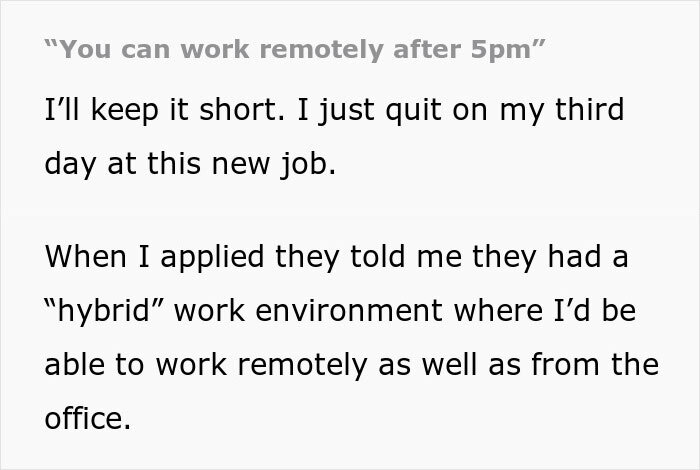
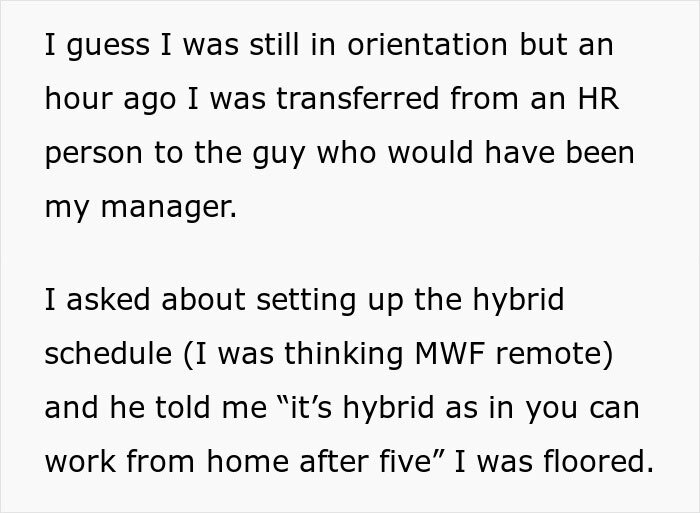
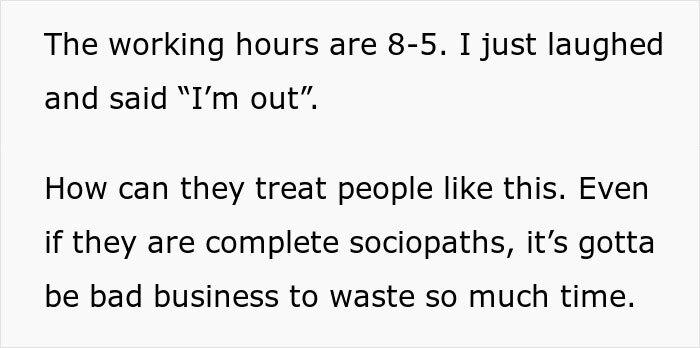
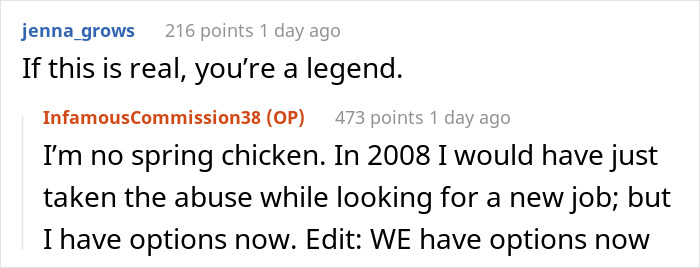


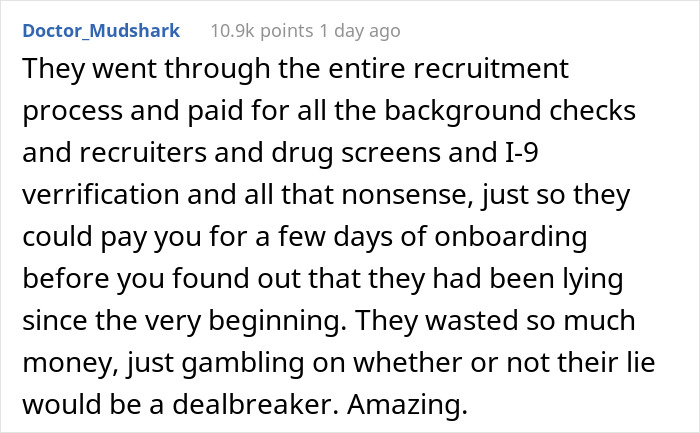



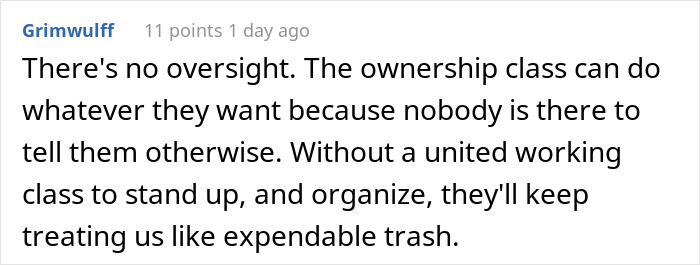
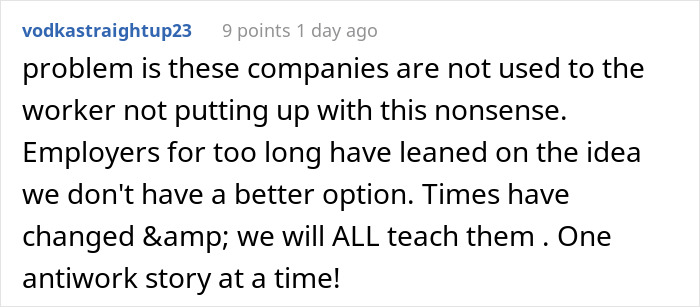
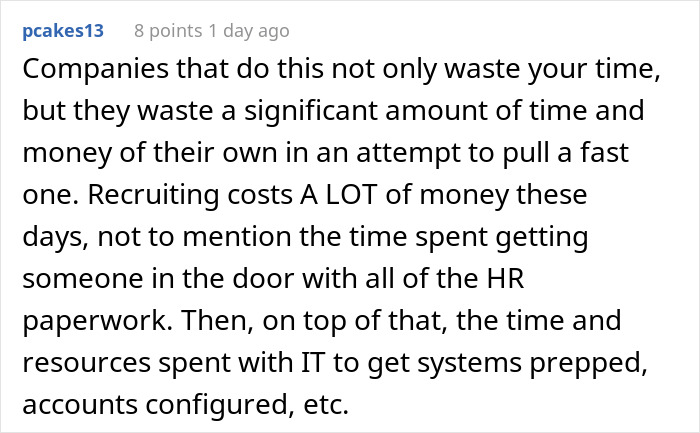
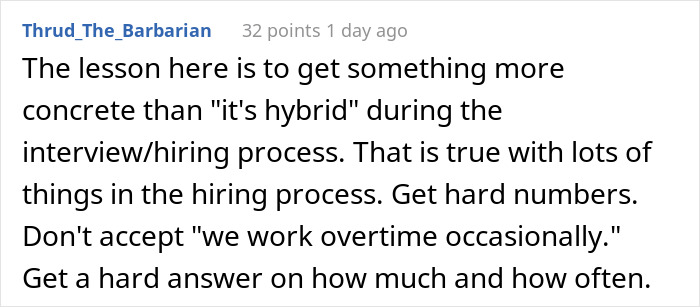

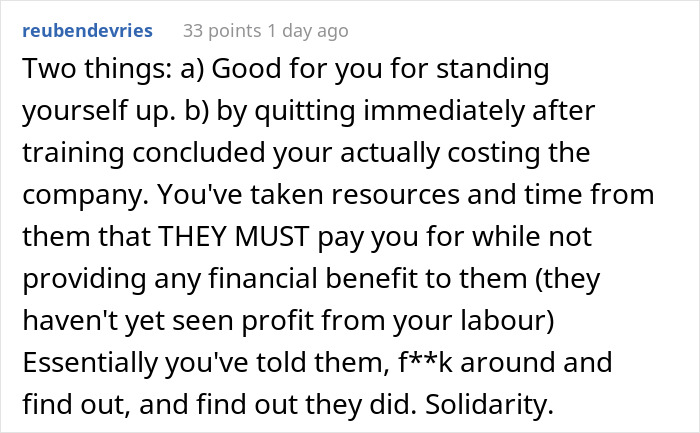
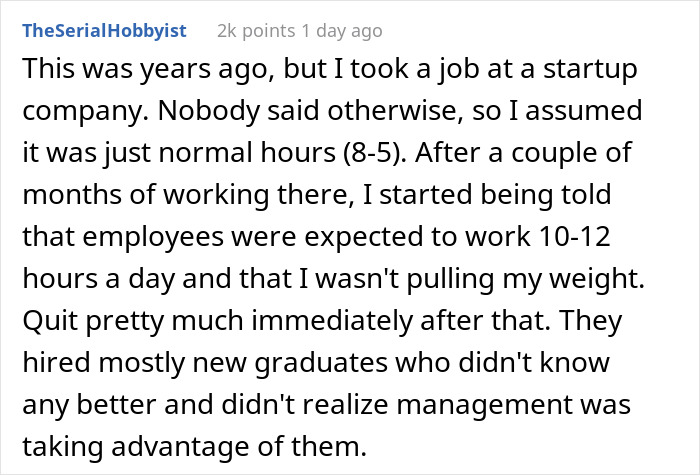
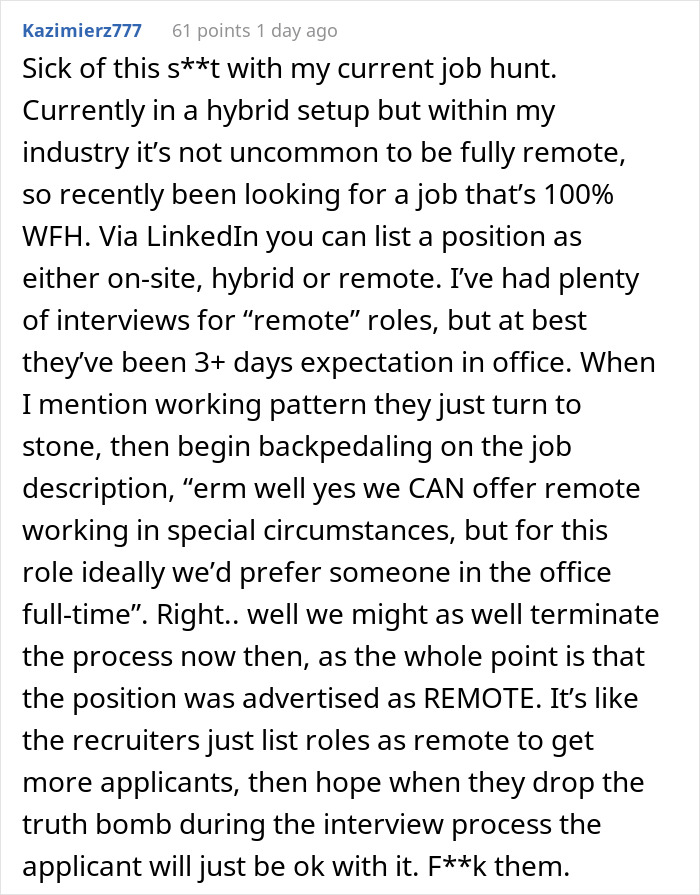
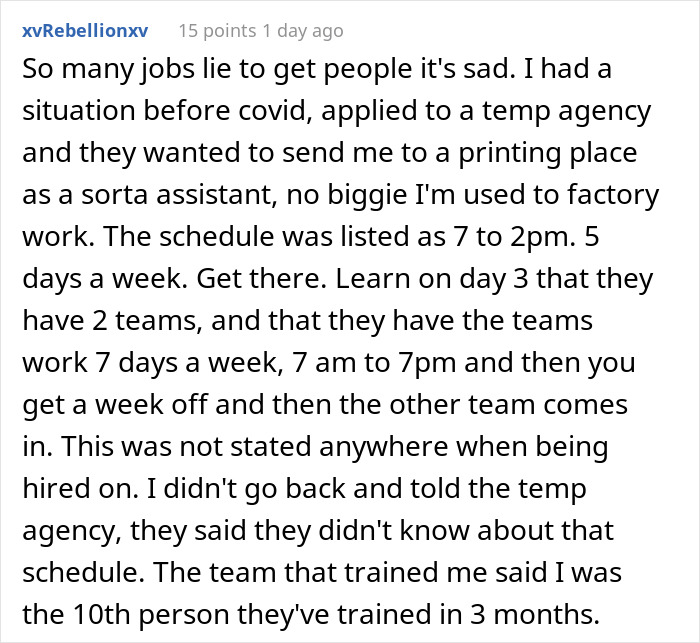
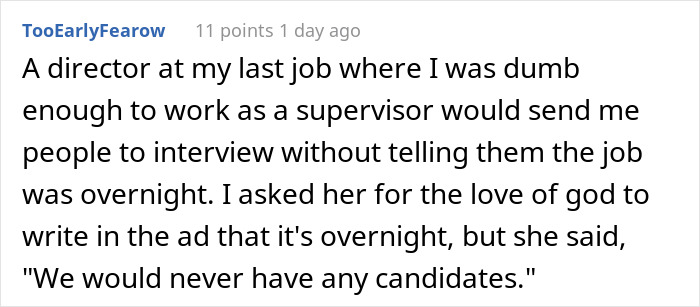
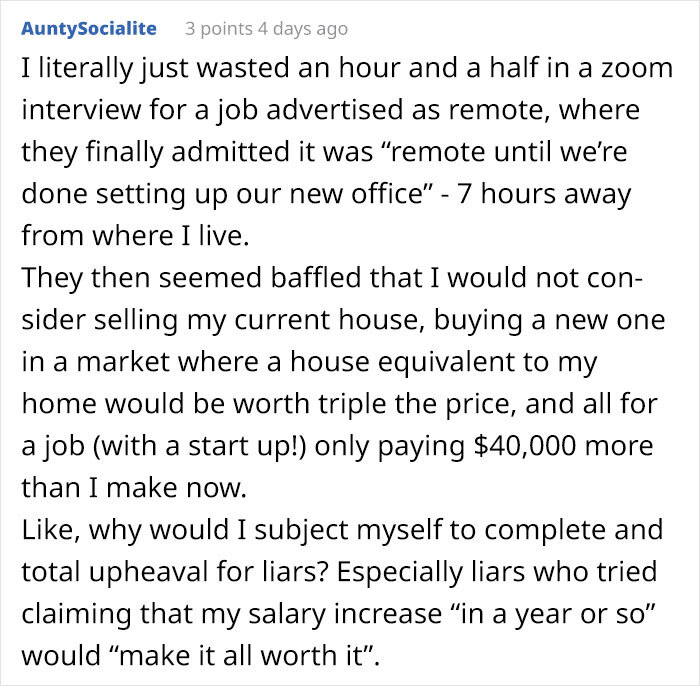
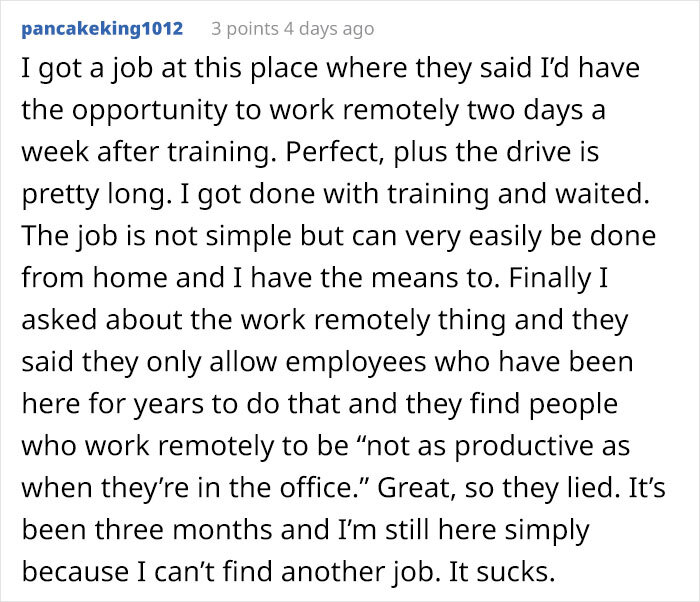
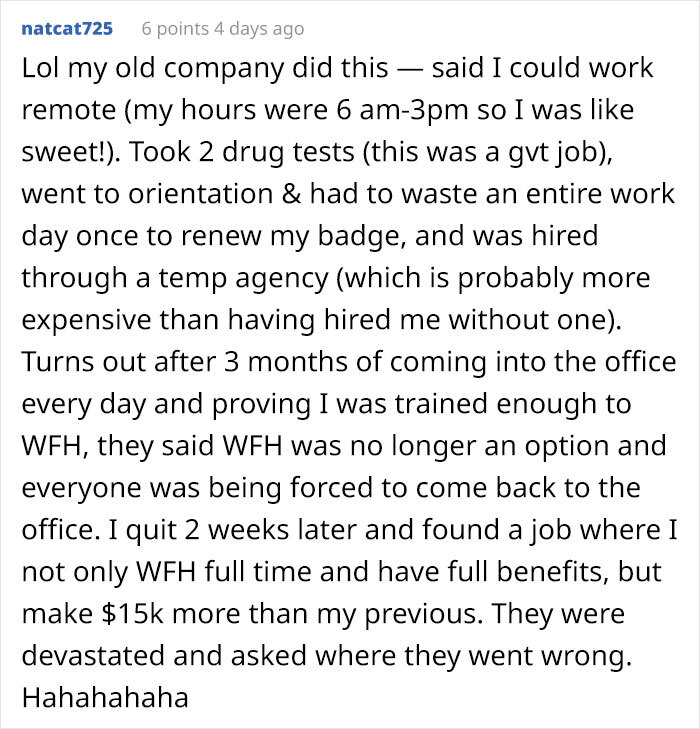
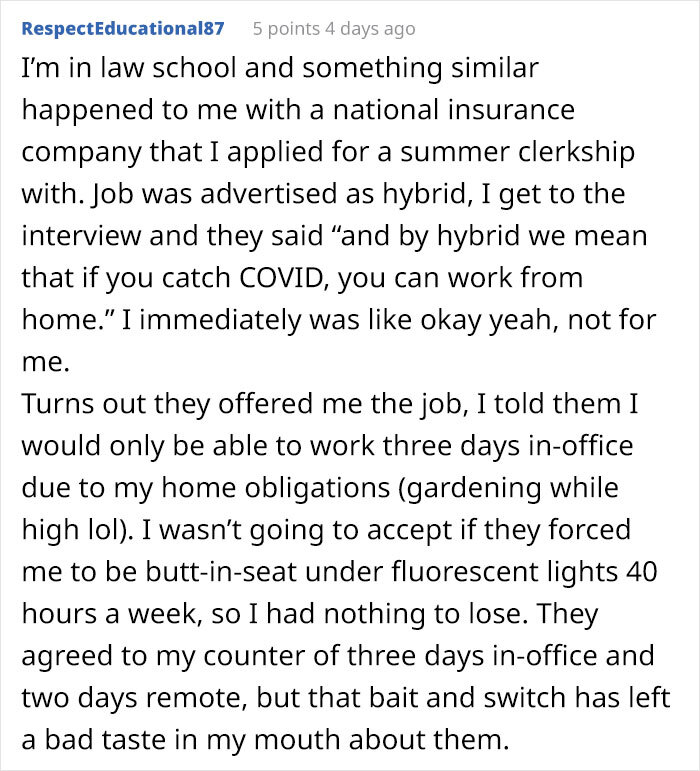
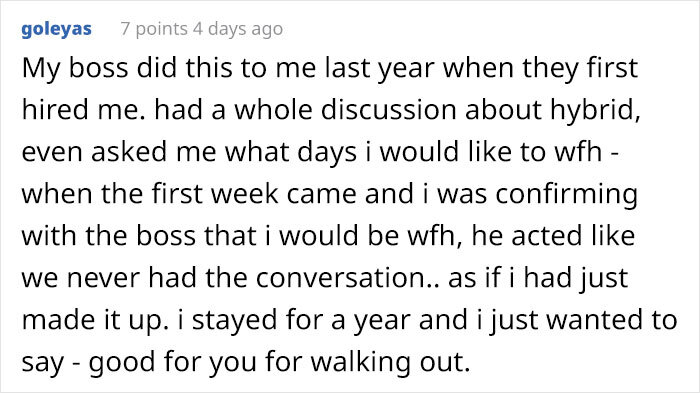
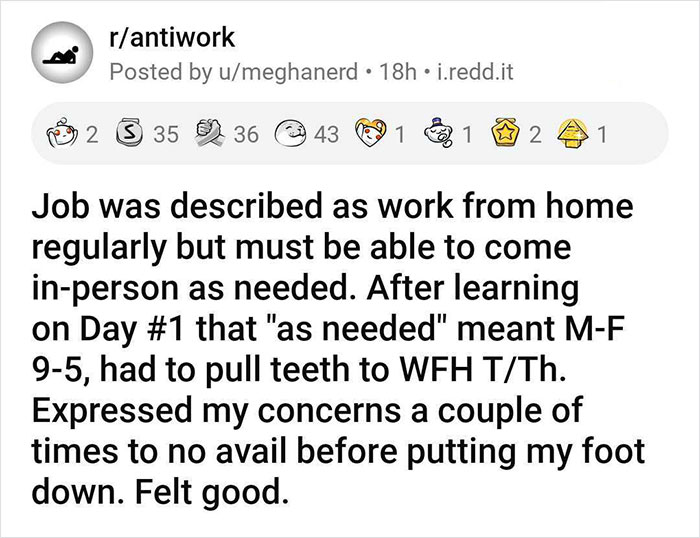
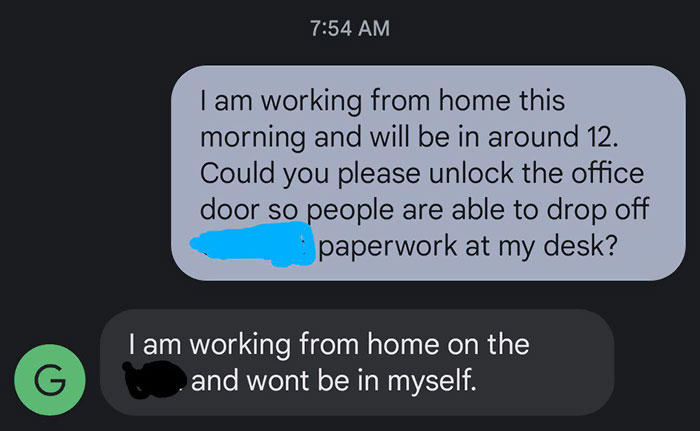
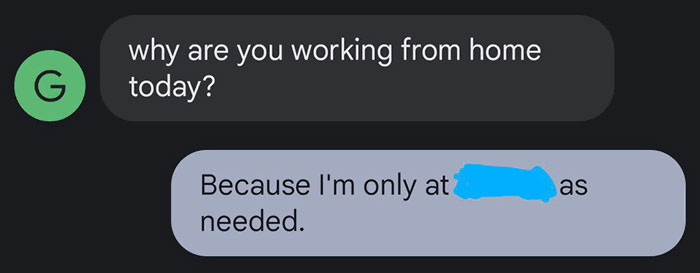
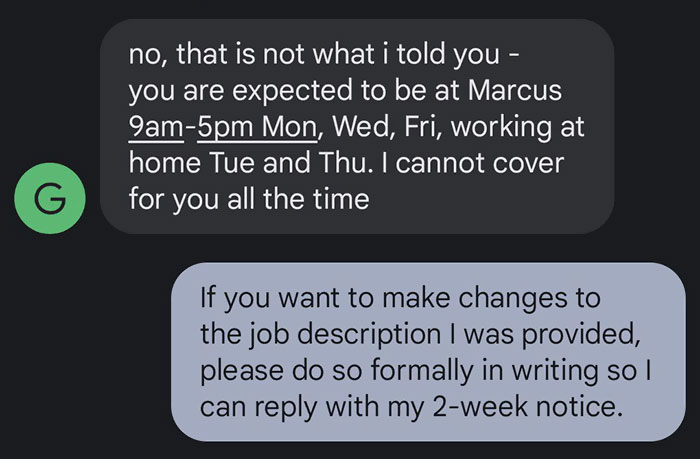
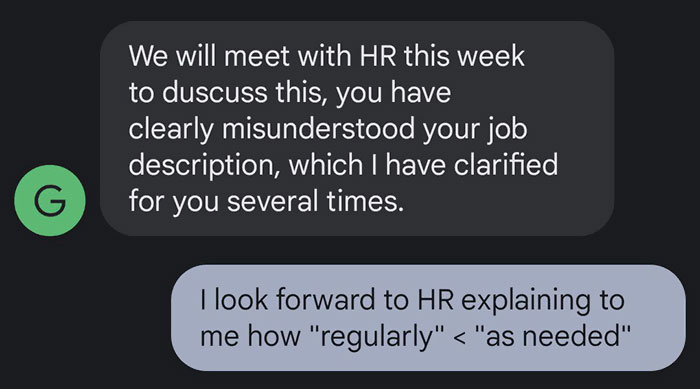
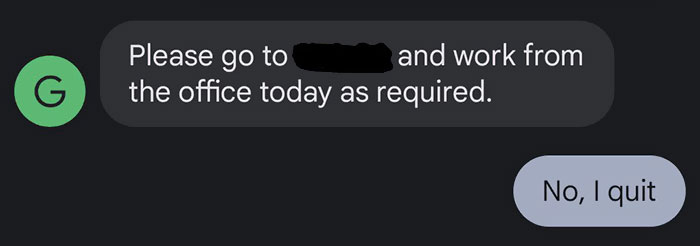
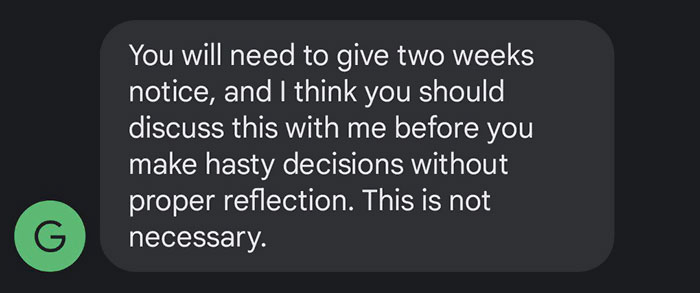
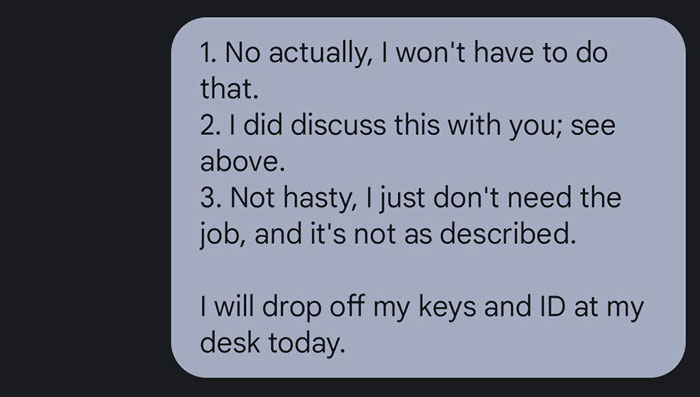
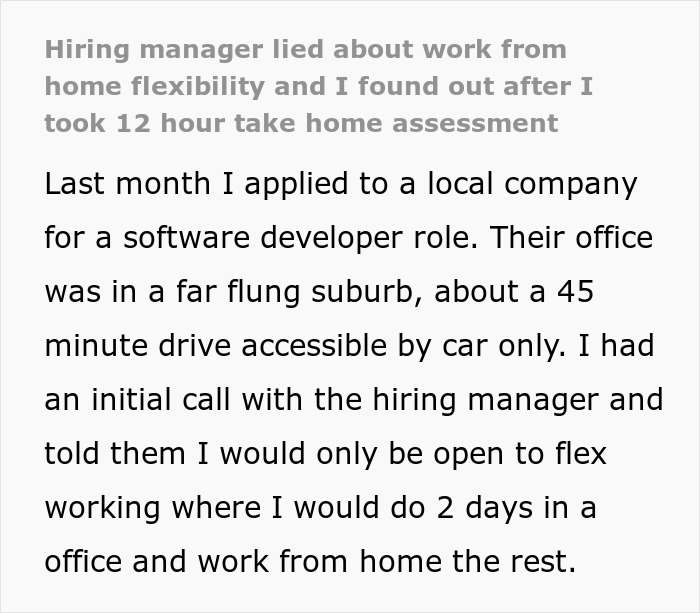
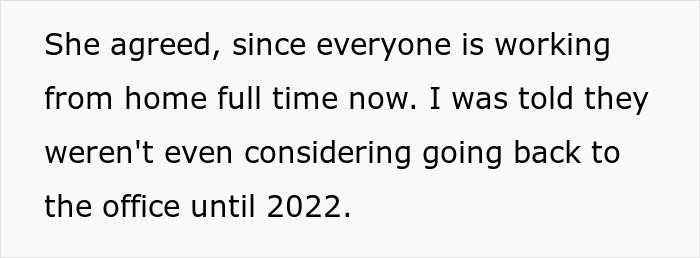
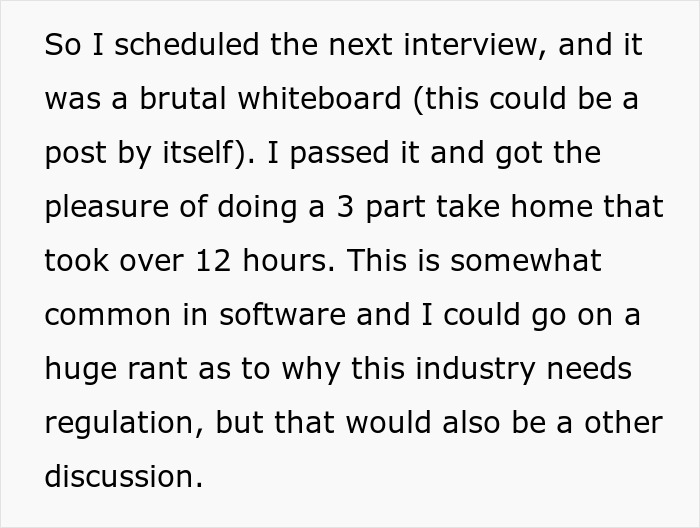
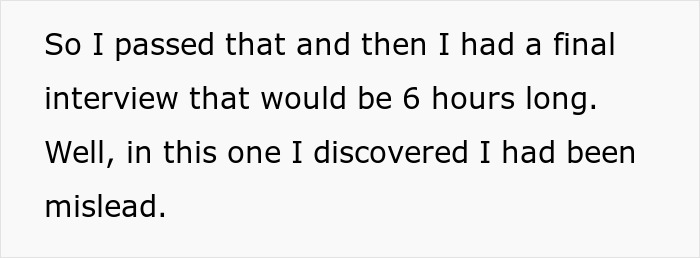
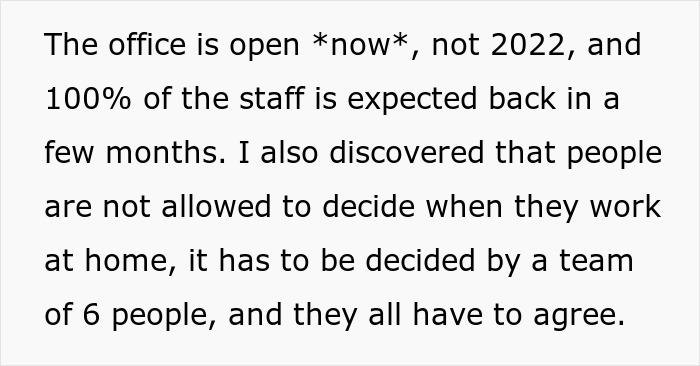
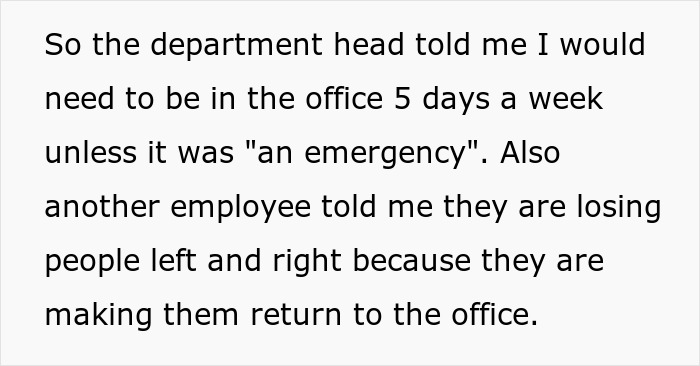
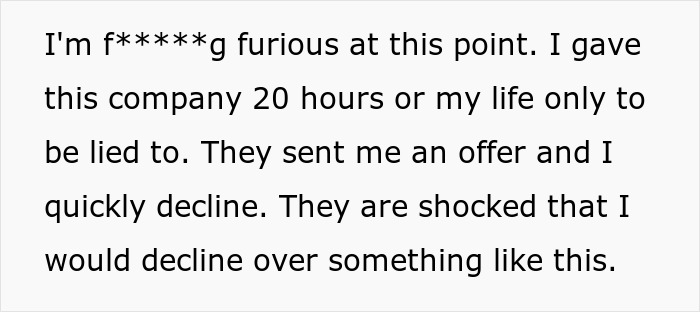

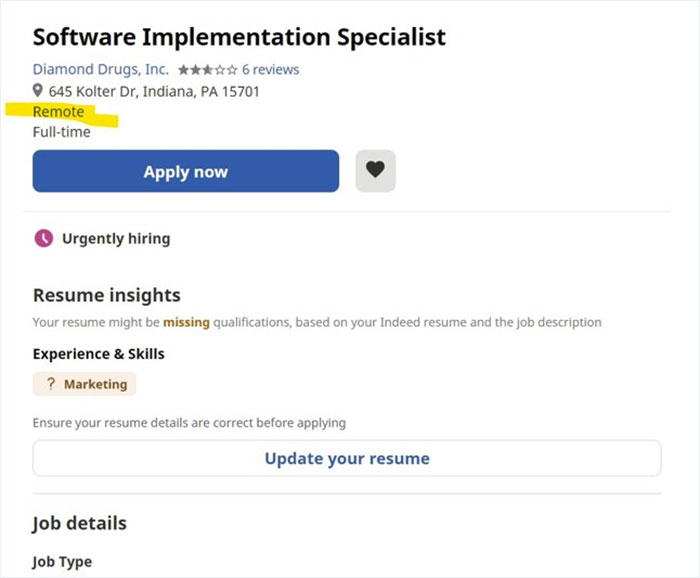
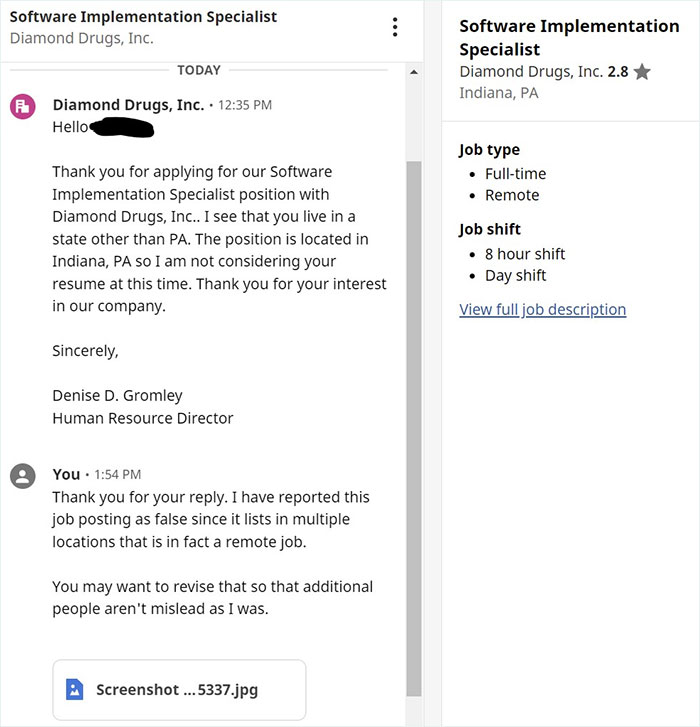
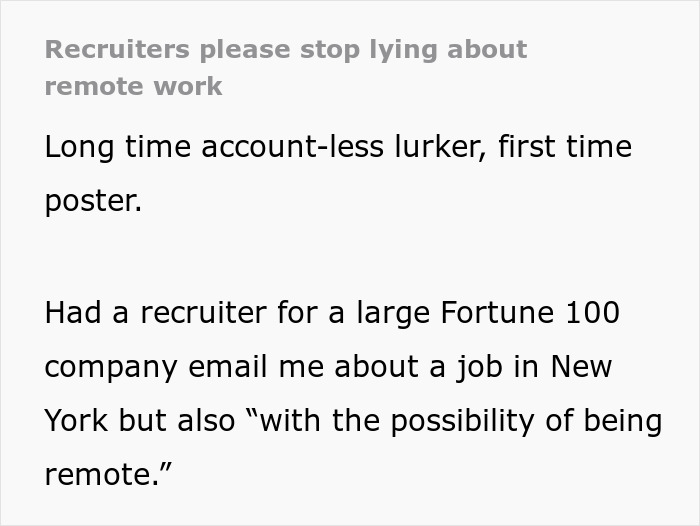
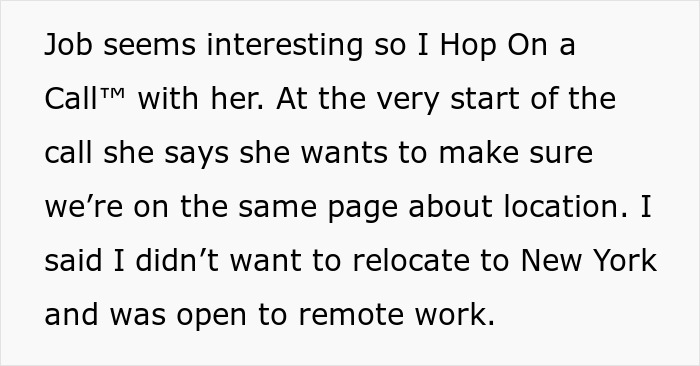

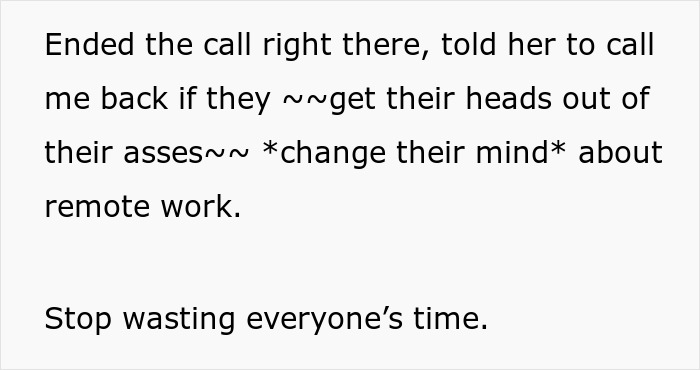
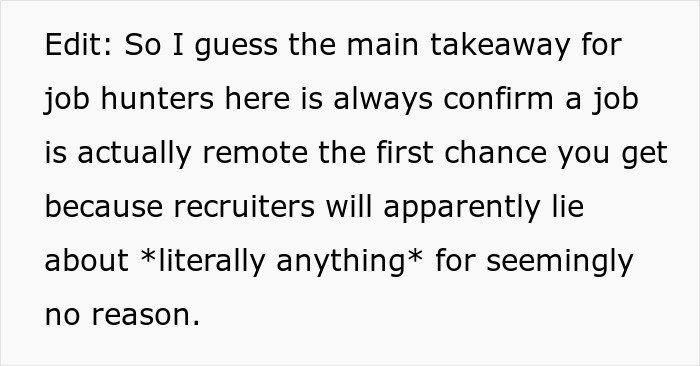












































87
49